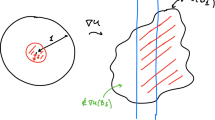Abstract
We present a method for finding the infimum of a degenerate integral quadratic functional by passing from a given functional to another quadratic functional that is nondegenerate with respect to some new control. The minimum point of the latter can be found by a standard procedure. This point corresponds to a minimizing sequence for the original functional. The advantage of this method over the well-known regularization method (addition of a small nondegenerate term) is that the latter requires solving a parametric series of problems with a vanishingly small additional term, while our method deals with a single problem.
Similar content being viewed by others
Notes
A sketch of the method was presented in [9].
References
B. D. O. Anderson and J. B. Moore, Optimal Control: Linear Quadratic Methods (Prentice Hall, Englewood Cliffs, NJ, 1990).
D. S. Bernstein and V. Zeidan, “The singular linear–quadratic regulator problem and the Goh–Riccati equation,” in Decision and Control: Proc. 29th IEEE Conf., Honolulu, 1990 (IEEE, Washington, DC, 1990), Vol. 1, pp. 334–339.
A. E. Bryson Jr. and Yu-Chi Ho, Applied Optimal Control: Optimization, Estimation and Control (Blaisdell Publ., Walltham, MA, 1969).
D. J. Clements and B. D. O. Anderson, Singular Optimal Control: The Linear–Quadratic Problem (Springer, Berlin, 1978), Lect. Notes Control Inf. Sci. 5.
M. G. Dmitriev and G. A. Kurina, “Singular perturbations in control problems,” Autom. Remote Control 67 (1), 1–43 (2006) [transl. from Avtom. Telemekh., No. 1, 3–51 (2006)].
A. V. Dmitruk, “Quadratic conditions for a weak minimum for singular regimes in optimal control problems,” Sov. Math., Dokl. 18, 418–422 (1977) [transl. from Dokl. Akad. Nauk SSSR 233 (4), 523–526 (1977)].
A. V. Dmitruk, “Quadratic conditions for a Pontryagin minimum in an optimum control problem linear in the control. I: A decoding theorem,” Math. USSR, Izv. 28 (2), 275–303 (1987) [transl. from Izv. Akad. Nauk SSSR, Ser. Mat. 50 (2), 284–312 (1986)].
A. V. Dmitruk, “Jacobi type conditions for singular extremals,” Control Cybern. 37 (2), 285–306 (2008).
A. V. Dmitruk and N. A. Parilova, “On the minimization of a degenerate quadratic functional,” IFAC-PapersOnLine 51 (32), 708–711 (2018).
A. V. Dmitruk and K. K. Shishov, “Analysis of a quadratic functional with a partly degenerate Legendre condition,” Moscow Univ. Comput. Math. Cybern. 34 (2), 56–65 (2010) [transl. from Vestn. Mosk. Univ., Ser. 15: Vychisl. Mat. Kibern., No. 2, 11–19 (2010)].
I. M. Gelfand and S. V. Fomin, Calculus of Variations (Fizmatgiz, Moscow, 1961; Prentice-Hall, Englewood Cliffs, NJ, 1965).
V. Y. Glizer, “Solution of a singular optimal control problem with state delays: A cheap control approach,” in Optimization Theory and Related Topics: A Workshop in Memory of Dan Butnariu, Haifa, 2010, Ed. by S. Reich and A. J. Zaslavski (Am. Math. Soc., Providence, RI, 2012), Contemp. Math. 568, pp. 77–107.
B. S. Goh, “Necessary conditions for singular extremals involving multiple control variables,” SIAM J. Control 4 (4), 716–731 (1966).
M. R. Hestenes, “Quadratic control problems,” J. Optim. Theory Appl. 17 (1/2), 1–42 (1975).
A. D. Ioffe and V. M. Tikhomirov, Theory of Extremal Problems (Nauka, Moscow, 1974; North-Holland, Amsterdam, 2009).
D. H. Jacobson, “A general sufficiency theorem for the second variation,” J. Math. Anal. Appl. 34, 578–589 (1971).
A. Jameson and R. E. O’Malley Jr., “Cheap control of the time-invariant regulator,” Appl. Math. Optim. 1 (4), 337–354 (1975).
A. A. Milyutin, A. V. Dmitruk, and N. P. Osmolovskii, The Maximum Principle in Optimal Control (Tsentr Prikl. Issled. Mekh.-Mat. Fak. Mosk. Gos. Univ., Moscow, 2004) [in Russian].
P. J. Moylan and J. B. Moore, “Generalizations of singular optimal control theory,” Automatica 7, 591–598 (1971).
J. O’Reilly, “Partial cheap control of the time-invariant regulator,” Int. J. Control 37, 909–927 (1983).
A. Sabery and P. Sannuti, “Cheap and singular controls for linear quadratic regulators,” IEEE Trans. Automat. Control 32, 208–219 (1987).
J. L. Speyer and D. H. Jacobson, “Necessary and sufficient conditions for optimality for singular control problems; a transformation approach,” J. Math. Anal. Appl. 33 (1), 163–187 (1971).
Author information
Authors and Affiliations
Corresponding author
Additional information
Translated from Trudy Matematicheskogo Instituta imeni V.A. Steklova, 2021, Vol. 315, pp. 108–127 https://doi.org/10.4213/tm4236.
Translated by I. Nikitin
Rights and permissions
About this article
Cite this article
Dmitruk, A.V., Manuilovich, N.A. Minimization of Degenerate Integral Quadratic Functionals. Proc. Steklov Inst. Math. 315, 98–117 (2021). https://doi.org/10.1134/S0081543821050084
Received:
Revised:
Accepted:
Published:
Issue Date:
DOI: https://doi.org/10.1134/S0081543821050084



